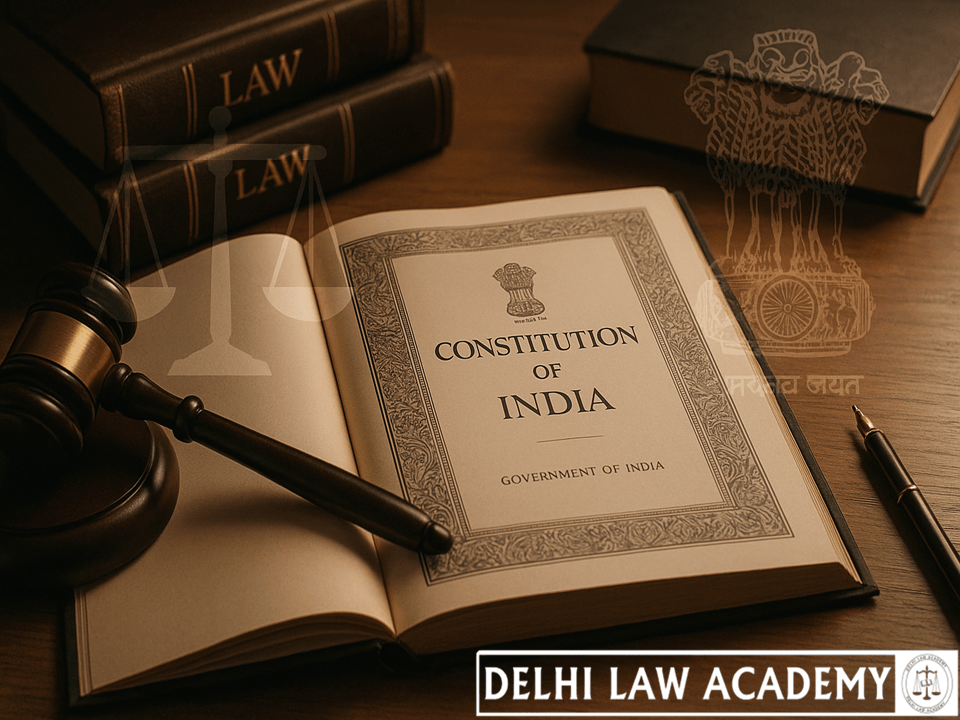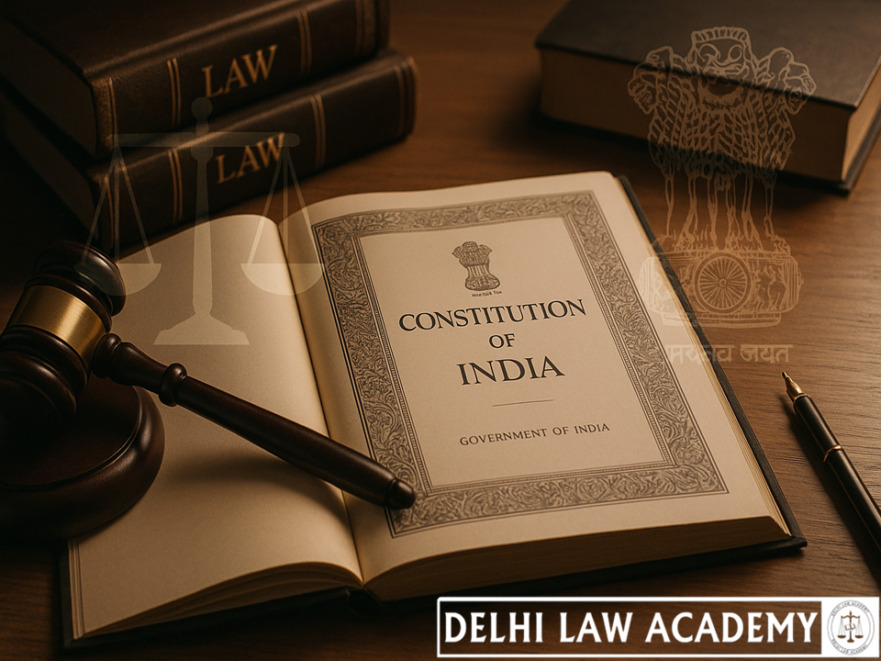
📘 S. R. Bommai v. Union of India (1994 SC) – Article 356
Delhi Law Academy Jaipur presents below for aspirants of RJS, DJS, PCS (J) and other Judicial Services throughout India a summarized version of the Supreme Court judgment in the case of interpreting the Constitutional provisions contained in Article 356.
📜 Case Law on Article 356
S. R. Bommai v. Union of India [1994 SC]
🔵 TOPIC:
- Constitutional validity of a Proclamation issued by the President under Article 356(1)
⚖️ JUDGMENT
P.B. SAWANT, J.
91. Our conclusions, therefore, may be summarised as under:
I. The validity of the Proclamation issued by the President under Article 356(1) is judicially reviewable to the extent of examining whether it was issued on the basis of any material at all or whether the material was relevant or whether the Proclamation was issued in the mala fide exercise of the power.
II. Article 74(2) is not a bar against the scrutiny of the material on the basis of which the President had arrived at his satisfaction.
IV. Since the provisions contained in clause (3) of Article 356 are intended to be a check on the powers of the President under clause (1) thereof, it will not be permissible for the President to exercise powers under sub-clauses (a), (b) and (c) of the latter clause, to take irreversible actions till at least both the Houses of Parliament have approved of the Proclamation.
V. If the Proclamation issued is held invalid, then notwithstanding the fact that it is approved by both Houses of Parliament, it will be open to the court to restore the status quo ante to the issuance of the Proclamation and hence to restore the Legislative Assembly and the Ministry.
VIII. Secularism is a part of the basic structure of the Constitution.
B P Jeevan Reddy, J.
365. We may summarise our conclusions now:
(1) Article 356 of the Constitution confers a power upon the President to be exercised only where he is satisfied that a situation has arisen where the Government of a State cannot be carried on in accordance with the provisions of the Constitution. Under our Constitution, the power is really that of the Union Council of Ministers with the Prime Minister at its head. The satisfaction contemplated by the article is subjective in nature.
(3) Though the power of dissolving of the Legislative Assembly can be said to be implicit in clause (1) of Article 356, it must be held, having regard to the overall constitutional scheme that the President shall exercise it only after the Proclamation is approved by both Houses of Parliament under clause (3) and not before. Until such approval, the President can only suspend the Legislative Assembly by suspending the provisions of Constitution relating to the Legislative Assembly under sub-clause (c) of clause (1). The dissolution of Legislative Assembly is not a matter of course. It should be resorted to only where it is found necessary for achieving the purposes of the Proclamation.
(5)(a) Clause (3) of Article 356 is conceived as a check on the power of the President and also as a safeguard against abuse. In case both Houses of Parliament disapprove or do not approve the Proclamation, the Proclamation lapses at the end of the two-month period. In such a case, Government which was dismissed revives. The Legislative Assembly, which may have been kept in suspended animation gets reactivated. Since the Proclamation lapses — and is not retrospectively invalidated — the acts done, orders made and laws passed during the period of two months do not become illegal or void. They are, however, subject to review, repeal or modification by the Government/Legislative Assembly or other competent authority.
(5)(b) However, if the Proclamation is approved by both the Houses within two months, the Government (which was dismissed) does not revive on the expiry of period of the proclamation or on its revocation. Similarly, if the Legislative Assembly has been dissolved after the approval under clause (3), the Legislative Assembly does not revive on the expiry of the period of Proclamation or on its revocation.
(6) Article 74(2) merely bars an enquiry into the question whether any, and if so, what advice was tendered by the Ministers to the President. It does not bar the Court from calling upon the Union Council of Ministers (Union of India) to disclose to the Court the material upon which the President had formed the requisite satisfaction. The material on the basis of which advice was tendered does not become part of the advice. Even if the material is looked into by or shown to the President, it does not partake the character of advice. Article 74(2) and Section 123 of the Evidence Act cover different fields. It may happen that while defending the Proclamation, the Minister or the official concerned may claim the privilege under Section 123. If and when such privilege is claimed, it will be decided on its own merits in accordance with the provisions of Section 123.
(7) The Proclamation under Article 356(1) is not immune from judicial review. The Supreme Court or the High Court can strike down the Proclamation if it is found to be mala fide or based on wholly irrelevant or extraneous grounds. When called upon, the Union of India has to produce the material on the basis of which action was taken. It cannot refuse to do so, if it seeks to defend the action. The court will not go into the correctness of the material or its adequacy. Its enquiry is limited to see whether the material was relevant to the action. Even if part of the material is irrelevant, the court cannot interfere so long as there is some relevant material.
(8) If the Court strikes down the proclamation, it has the power to restore the dismissed Government to office and revive and reactivate the Legislative Assembly wherever it may have been dissolved or kept under suspension. In such a case, the Court has the power to declare that acts done, orders passed and laws made during the period the Proclamation was in force shall remain unaffected and be treated as valid.
(10) Secularism is one of the basic features of the Constitution. While freedom of religion is guaranteed to all persons in India, from the point of view of the State, the religion, faith or belief of a person is immaterial. To the State, all are equal and are entitled to be treated equally. In matters of State, religion has no place. No political party can simultaneously be a religious party. Politics and religion cannot be mixed. Any State Government which pursues unsecular policies or unsecular course of action acts contrary to the constitutional mandate and renders itself amenable to action under Article 356.
(11) The Proclamation dated April 21, 1989 in respect of Karnataka and the Proclamation dated October 11, 1991 in respect of Meghalaya are unconstitutional. But for the fact that fresh elections have since taken place in both the States — and new Legislative Assemblies and Governments have come into existence — we would have formally struck down the Proclamations and directed the revival and restoration of the respective Governments and Legislative Assemblies.
(12) The Proclamations dated January 15, 1993 in respect of Madhya Pradesh, Rajasthan and Himachal Pradesh are not unconstitutional.
* * * * * * * * *
📘 Stay Ahead with Delhi Law Academy!
Get access to free monthly current affairs, read our insightful blogs,
and explore free study resources prepared by experts at DLA Jaipur. 🚀
❓ FAQs on Article 356 & S.R. Bommai Judgment (1994)
⚖️ Is a Proclamation under Article 356 subject to judicial review?
Yes. The S.R. Bommai judgment held that a Proclamation under Article 356 can be judicially reviewed to check whether there was any material at all, whether the material was relevant, or whether the action was taken mala fide. Courts cannot question the adequacy of the material, but they can examine its relevance.
📜 Can the President dissolve a State Legislative Assembly immediately under Article 356?
No. The Court ruled that dissolution of the Legislative Assembly can take place only after Parliament approves the Proclamation under Article 356(3). Until approval, the President may keep the Assembly in suspended animation but cannot dissolve it.
🧾 What happens if Parliament disapproves a Proclamation under Article 356?
If Parliament disapproves or fails to approve the Proclamation within two months, the Proclamation lapses. In such cases, the dismissed State Government revives, and the Legislative Assembly—if suspended—gets reactivated. Acts done during this period remain valid but may be reviewed or modified by the State.
🏛️ Can the Court restore a dismissed State Government after striking down a Proclamation?
Yes. The Supreme Court held that if a Proclamation is declared unconstitutional, courts can restore the dismissed Government and revive the Legislative Assembly. Acts, laws, and orders passed while the Proclamation was in force remain valid but subject to review.
🕊️ How does secularism relate to Article 356 according to S.R. Bommai?
The Court affirmed that secularism is a basic feature of the Constitution. If a State Government acts in an unsecular manner or pursues unconstitutional policies, it may attract Article 356 action. Politics and religion cannot be mixed, and no political party can claim a religious identity.
🔍 What is the significance of Article 74(2) in judicial review of President’s Rule?
Article 74(2) bars inquiry into the specific advice tendered by Ministers to the President, but it does not prevent courts from examining the material on which the President’s satisfaction was based. The Union Government must produce such material when defending a Proclamation under Article 356.
Contact us
📍 Delhi Law Academy – Jaipur Branch
6C, Tower 2, Coaching Hub, Pratap Nagar, Jaipur – 302033
📞 Phone:
+91 9911916552
+91 8447285606
✉️ Email:
contactus@delhilawacademy.com

